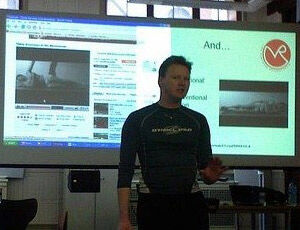University News Last updated 27 October 2011

Digital technology is stifling human creativity and judgment - leading to unprecedented risk-taking that has directly contributed to the current economic crisis, claims a leading Birmingham City University academic.
Gregory Sporton is the newly appointed Professor of Digital Creativity at the School of Art within the Birmingham Institute of Art and Design (BIAD) and is set to deliver an inaugural professorial lecture in the Recital Hall at the Birmingham Conservatoire on Tuesday, November 1, from 6:30pm. His provocative talk will be supported by examples of the use of creative ‘supercomputing’ techniques.
Entitled ‘From Things to Bits’, Professor Sporton’s lecture will focus on the global shift since the 1990s from trading in tangible commodities - ‘things’ - to the world-wide transaction in ‘conceptual bits’, powered by the binary revolution in digital communication.
“You may believe that it’s better to move concepts and ideas around the world via email or similar digital communications rather than actual commodities and products. But what has actually happened as a consequence is an unprecedented re-calibration of risk,” said Professor Sporton.
“This in turn has influenced how debt has been managed as part of a global market and the creation of powerful fiscal instruments such as Credit Default Swaps, effectively allowing an investor in Europe to own part of a small house in Kansas. Unfortunately, because these digital transactions are so abstract we have now found ourselves in a terrible economic crisis.”
Professor Sporton goes on to argue that a large number of “intelligent, creative and emphatic” people are designing technology-based products that create a barrier for others to express similar characteristics.The professor believes engineers are developing products that react to perceived technological innovation rather than supporting the needs of users to exercise their own creativity and individual judgement.
"There is no doubting the influence of digital technology on how we live now, but we need to ask whether this is the best way for us as a culture. This is especially true given their colonisation of our work and social experience,” Professor Sporton added.
“This is changing us, socially and economically, and we are dominated by the demands of the technology. And yet for all their cleverness, digital technology frequently requires the human imagination to fill the gap the engineers have yet to breach. That imagination is under threat from the very technology that claims to support it."
‘From Things to Bits’ is open to the public and free to attend - but book in advance to avoid disappointment. The programme will also feature a short performance of a new work ‘Never Talk to Strangers’, developed with the University’s pioneering Visualisation Research Unit (VRU) project and dancers from dna3d, who combine the performing and visual arts. University researchers will be experimenting with a number of innovative devices including body-based sound and visual generating systems.
’From Things to Bits’ will be introduced by Fred Inglis, Emeritus Professor of Cultural Studies at the University of Warwick.
Reserve a place by emailing julia.burdett@bcu.ac.uk or contacting her on 0121 331 7850. The event will be held at the Birmingham Conservatoire recital hall on Tuesday, 1st November, doors will be open from 6:30pm with a reception ahead of the start of the performance at 7:15pm.